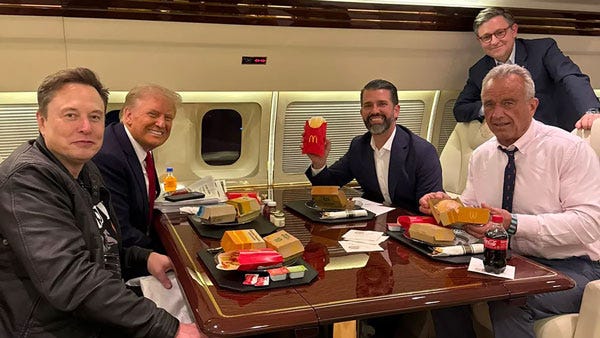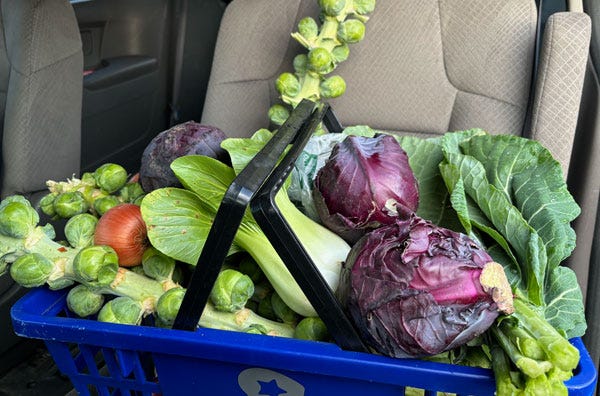I Won't Tell You to Avoid McDonald's
What my advocacy for avoiding the drive thru has taught me about how to cope with the current political climate
Welcome to another edition of Willoughby Hills!
This newsletter explores topics like history, culture, work, urbanism, transportation, travel, agriculture, self-sufficiency, and more.
Nearly 20 years ago, I had an experience that completely changed the course of my life for the better. I was working as a production assistant with This Old House on a renovation in Austin, Texas that was branded as our first “green” project. We were slightly expanding a bungalow from the 1920s and were meticulously thinking through every detail in the house to be as sustainable as possible: low-VOC paints, LED lighting, recycled and local materials, the list goes on and on.
This project was a wake up call. I saw how meticulous the general contractor was about everything that went inside that house and realized that I should be just as careful about everything that I consume, whether that’s food, personal care products, clothing, or anything else.
As I’ve written about before, on the food side this journey started by sourcing as much as possible organically. If the VOCs in my paint could make me sick just by unknowingly breathing the fumes long after the walls were dry, I realized the synthetic pesticides and fertilizers in all of our foods were probably not worth consuming either.
This was 2007, a time when books like Fast Food Nation and The Omnivore’s Dilemma and films like Supersize Me were very much in the zeitgeist. As I turned to eating as organically and sustainably as possible, I also felt the need to turn against anything that didn’t fit that mold. My sights were trained specifically on McDonald’s and letting people know how bad it was for their health.

It’s hard to imagine now, but like any child of the 1980s and 1990s, McDonald’s was a pretty big part of my childhood. I had friends that had birthday parties in the restaurant. I remember winning an elementary school auction where our teacher took a group maybe four of us out for dinner and a movie. The dinner was at McDonald’s.
The Golden Arches is where people went on dates in middle and high school and where they met friends after school. It wasn’t just for young people either- our local McDonald’s dining room was often filled with retirees who met up for coffee and to socialize.

By the early 2000s though, McDonald’s was losing popularity with a certain group of people, which included me. As the impacts of factory farming became widespread, McDonald’s was the poster child for the problems with the industrial beef industry. The chain was criticized for all of the preservatives, artificial flavors, sugar, and high fructose corn syrup added to their meals. People were shocked by the high calories and amount of fat in many of their menu items. Plus, there was all that waste of paper wrappers, bags, and disposable napkins.
As somebody new to conscious eating, I was shocked by what I was learning about McDonald’s and was eager to share it with anyone who would listen. I spent lots of time sharing the new information I was learning with friends, family, and colleagues, hoping that if they just had the information, they too would recognize the dangers of fast food and immediately give it up.
But that didn’t happen. At all.
I spent my time earnestly proselytizing , people would listen when I would talk, but it didn’t really change any of their behaviors. Many would still go to the Drive Thru and order a Big Mac, whether out of habit, comfort, cost, or some other reason.

It was exhausting trying to change everyone’s diet and way of thinking about the health of our bodies and our planet. I finally realized after a few years that my best bet was to work on what I could control: how I approached eating. I couldn’t worry about what other people were doing, even if I thought they were harming all of us collectively.
If you’ve been reading this newsletter for any length of time, you know that improving what I eat and how it is sourced has been a continual journey, one that improves slightly with each year.
Yesterday, we happened to be driving through Downtown Amherst Massachusetts where there was a farmers market on the common. We bought some fresh microgreens from a vendor that harvested them right from the growing trays in front of us. We also bought some local, pasture-raised ground lamb that I cooked into a delicious shepherd’s pie last night. The meal also included local vegetables and herbs from the farm stand 7 minutes down the road and milk and cheese purchased from a local dairy. It’s the kind of meal that’s taken me years to have the skill to both source and cook.
It’s also the type of meal that I likely would never have been able to make had all of my energy been focused on getting others to avoid McDonald’s or the other harmful parts of our national food system.
When I stopped paying attention to what other people were doing and instead focused on what I was doing, I realized that the industrialized food system mattered much less to me. I was building my own alternative, piece by piece, year by year. I was connecting with farmers directly, learning about their growing practices, and sourcing everything as locally as possible for as much of the year as possible.
Sure McDonald’s continues to exist (its stock has increased nearly ten-fold since 2007), but that doesn’t mean that I have to engage with it or make it any part of my daily life.
I keep thinking about my journey from trying to show people every problem with the American diet and simply opting out and building my own version of something sustainable. I think there’s an analogy to be made between what I’ve learned about food and how we should come to terms with the results of the recent election.
During the first Trump administration, I was pretty tapped into the news and was pretty reactive to it. When my podcast launched in the spring of 2020 and this newsletter launched in the fall, Trump was in the Oval Office overseeing a disastrous response to the pandemic while the country marched for racial equality after the murder of George Floyd. It was a time when using our voices seemed to matter and speaking out against every little thing felt important.
If the last two and a half weeks since the election have been any indication, we are heading to a time where every action is meant to be provocative and we are meant to be on high alert at all times. Unqualified and incompetent cabinet picks like Linda McMahon, Pete Hegseth, and Matt Gaetz (who recently rescinded his name from consideration for attorney general) are meant to keep us angry. They’re also meant to distract from the bigger issues, like why has Elon Musk literally not left Trump’s side since the election?

I’m no longer in a place where I care to go on red alert ten times per day as another headline comes out about Trump or his team. I’m no longer in a place where I feel like I need to convince people that Trump is bad or that his policies are harmful.
Like McDonald’s, plenty of people know the problem. Plenty of people are still ordering from that menu. As I wrote earlier this month, Trump is no longer an underdog who lost the popular vote. Many, many Americans have seen what he has to offer and decided they want more of it.

I can spend the next four years shouting about each and every little decision, or I can spend that time working on building the alternative. I’m not exactly sure what that looks like yet: is it an alternative to the corporate media? Is it some alternative to our current political system? Is it just simply being engaged in mutual aid at the community level? For each of us, it will look different, but I think small, local community building is going to matter much more in the coming years.
Just like when I started on my food journey, my steps were small at first. I started in a conventional supermarket buying organic versions of familiar products (like Oreos), then moved to natural food chains like Whole Foods Market, and then finally built person to person relationships with small farmers in my area. I couldn’t have anticipated that end point or even that path a decade and a half ago. I’m still very much on this journey and don’t know how it will look a decade from now.
All I know is that I can’t survive another four years trying to convince people that Trump is a danger, that he’s a threat, and that we must resist every little thing.
I will still be paying attention to the news and still be speaking out when there are true dangers to fellow citizens (I’m imagining the mass deportations will be something that motivates many of us), but I can tune in once per day for a few minutes, instead of getting outraged at every tweet several times per day.
It takes work to imagine an alternative. It doesn’t happen overnight.
But as I learned with my food advocacy, people seem to pay more attention when I simply do my own thing and lead by example rather than when I shout down their choices.
Thanks for reading Willoughby Hills! Subscribe for free to receive new posts and support my work.
Related Reading
Don’t Take the Election Personally
If you’ve missed past issues of this newsletter, they are available to read here.







I'm assessing all my small steps. Had some setbacks, but I'm grateful for what I've been able to do.
How much longer will/can Musk & Trump's bromance last?